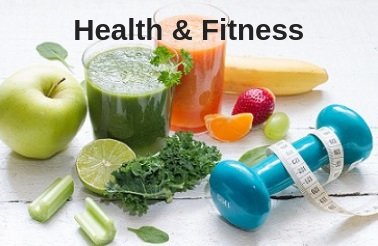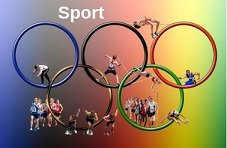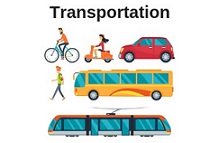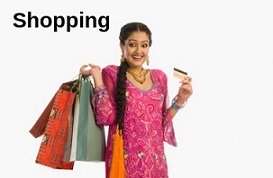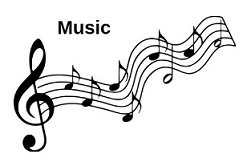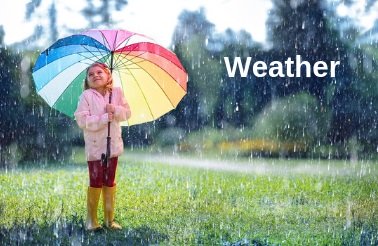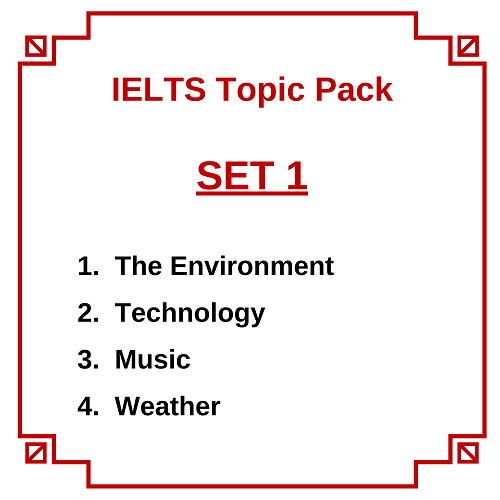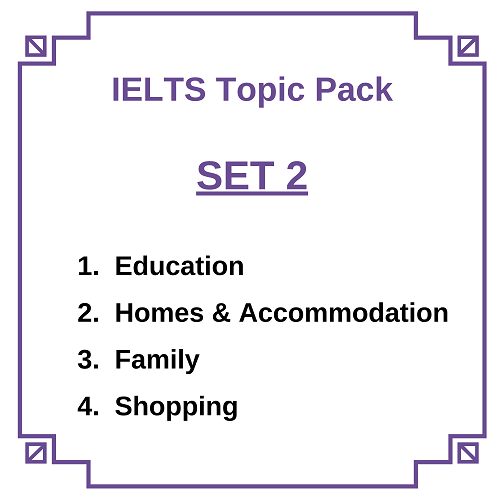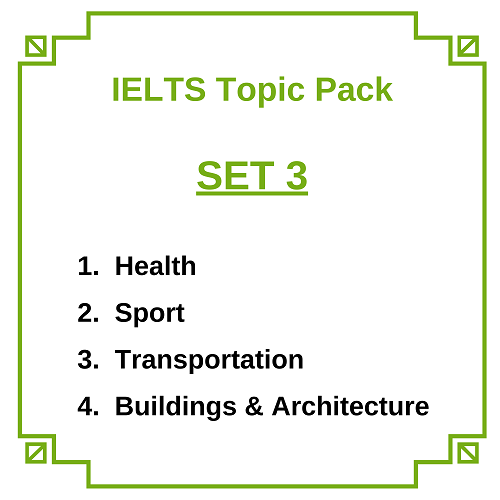Shopping Vocabulary
Shopping vocabulary can be useful when talking about a range of subjects and the topic of shopping itself is easy to talk about as it’s something we all do regularly.
Here are a few things you could be asked about:
- How you feel about shopping
- Your local shopping facilities
- Changes in shopping habits
- Online shopping
- Consumer protection
This page includes over 100 common words and phrases related to shopping. I’ve added an explanation for each one and a sample sentence to show it in context. This will help you to learn how to use it correctly.
Don’t try to learn them all. Look at my suggestions below as to the best way to use this comprehensive list of shopping vocabulary.
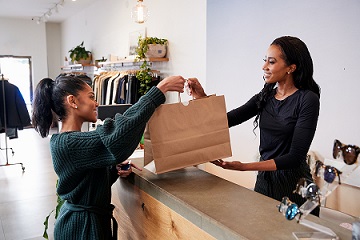 Do you enjoy shopping?
Do you enjoy shopping?To ensure that you’re well prepared to answer any shopping-related question, I’ve included four things here:
- IELTS-style questions on the topic of shopping
- Sample answers
- A list of common shopping vocabulary with definitions & sample sentences
- Links to online reading and listening resources
You’ll find PDF downloads of both the questions and sample answers and the shopping vocabulary list at the bottom of the respective sections.
The questions relate to the Speaking test because this part of the exam offers the broadest range of possible questions on the topic of shopping. They give the best opportunity for me to demonstrate the vocabulary and for you to practise using it.
I’ve included IELTS-style questions and answers for all three parts of the Speaking test. I've highlighted keywords and phrases in bold.
You'll find these words and phrases, and many others, in the vocabulary list beneath. The list also includes explanations and sample sentences and there’s an audio to listen to the pronunciation.
The shopping vocabulary list contains words and phrases relevant to all parts of the IELTS exam.
Finally, at the bottom of the page, I've added links to topical articles, short videos and podcasts that will help you to improve both your shopping vocabulary and your reading and listening skills.
IELTS-Style
Speaking Test Questions and Answers
Common shopping vocabulary is highlighted in bold.
Part 1
1) How do
you feel about shopping?
I love going shopping, especially bargain hunting in the sales. Every few months I go into the city on a shopping spree with my friends.
2) What types of shops do you use regularly?
I go to the supermarket once a week for my groceries, although I buy all my meat from the local butcher. When I go into town, I always have a browse around the department stores.
3) What changes have you seen in those shops in the past few years?
I’ve noticed that the supermarket seems to sell a wider range of goods and services every year. They now even have their own pharmacy. I think that the main difference in the department store in an improvement in their customer service.
4) Do you like shopping on the internet?
Yes, I do enjoy shopping online. You have so much choice on the internet and it’s easy to shop around. Also, you can purchase things immediately and they are often delivered the next day. It’s much quicker than waiting until you have time to go into town.
5) What kinds of things do you buy online?
I purchase books, electrical goods, gifts, stationery and, in fact, most everyday products on the internet. It’s really only clothes and shoes that I always buy on the high street as I like to try them on first.
 It's easy to shop online.
It's easy to shop online.Part 2
Describe your favourite shop.
You should say:
- where it is
- what it sells
- how often you go there
and explain why you think it is a good shop.
I particularly like browsing shops that sell outdoor wear, things like waterproof jackets, walking boots, hiking trousers and rucksacks. There are several in my home town but my favourite is called No Sweat. It’s an independent store and they stock all the big brand names in outdoor gear. Their goods are expensive but top quality
One reason I enjoy shopping there is their excellent customer service. The sales assistants are very helpful and do their best to advise you on the best products for your needs. They never try and give you the hard sell and will recommend a different brand that they don’t sell if they think it would suit you better.
They are extremely knowledgeable about outdoor gear, which is more than can be said of the shop assistants in similar stores in town. The other retail outlets are chain stores and they don’t give you the same personal service or feeling of confidence that they really know what they’re talking about.
I can’t say that I go to No Sweat very often but I always pop in for a spot of bargain hunting if they have a sale on or if I need something in particular. I try to avoid the shop otherwise as it’s just too tempting to spend money I can’t really afford. If I want something like an expensive new jacket, I generally save up for it.
The last time I went there was to buy a new pair of walking boots. By chance, they had an offer on a fabulous lightweight waterproof jacket in my favourite colour. It was at a real knock-down price so I just had to buy that as well. I also bought a couple of t-shirts that were reduced. It all added up to quite a lot of money but they gave me a free pair of walking socks and some stuff to clean my new boots. They usually give you free products if you make a large purchase. It makes you feel valued as a customer.
I think that’s why the shop has been so successful when most independent stores are struggling to compete with the big high street names. It’s because of the way they value their customers and give good value for money.
 My favourite shop sells walking gear.
My favourite shop sells walking gear.Part 3
1) Do you agree or disagree that women spend more time shopping than men?
I would definitely say that women go shopping more often than men and also spend longer looking for what they want. For a start, it is usually women who buy the groceries each week and also clothes for the children if they have a family. Many women I know purchase most of their husband’s clothes as well because their men hate shopping.
I think this is less the case with younger men as they are more fashion conscious and happy to hit the shops themselves. Brand named clothes are a status symbol with the younger generation as they like to dress to impress. Men more readily pay for expensive items, especially the latest electronic gadgets, and aren’t too bothered about discounts.
For women, shopping is often a social activity done with friends. It’s common to go window shopping and my sister’s idea of a fun morning is browsing the second-hand shops in town. You never see men doing either of these things.
2) Do people generally prefer to buy products from their own or from other countries?
I think it varies very much from person to person. On the one hand, there’s an increasing number of people who choose to buy their meat and vegetables from farm shops rather than supermarkets. This is partly to support the local economy but also because they are concerned that transporting produce around the world is contributing to global warming.
Unfortunately, supermarket products are often cheaper despite having travelled many miles to the shops. For example, I live in the countryside and can see sheep out of my window and yet it’s cheaper to buy lamb from New Zealand, 11,000 miles away, than it is to purchase local lamb.
So, on the other hand, you have people on a low budget who are forced to buy cheaper supermarket imports even if they don’t want to.
With most goods other than food, there’s often little choice but to buy foreign imports as most things in the shops come from abroad.
3) Why do you think some people purchase things that they do not need?
In my opinion, unnecessary purchases are made for several reasons. Firstly, many people, especially the younger generation, like to have the latest gadgets and fashions so they quickly discard old stuff. We have become a real throwaway society. Also, they want to have the same products as their friends whether they need them or not.
Secondly, these days we tend to have more spare cash to buy luxuries that our parents would not have been able to afford at our age.
Finally, I think that aggressive advertising convinces people that they need things that they don’t and, of course, the internet encourages impulse buying as shopping online is so quick and easy.
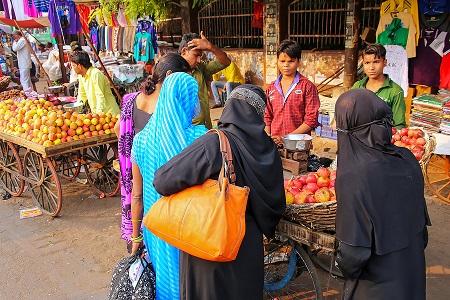 Women shopping at a market stall.
Women shopping at a market stall.Click this link to get a PDF download of these practise questions & sample answers.
Shopping Vocabulary
* Important
- Do not try and learn this list of shopping vocabulary.
- Identify the vocabulary you find useful for answering practise questions about shopping.
- Record these in your vocabulary notebook and practise using them regularly.
I recommend that you create
your own answers to the Speaking questions on this page. You will find many
other IELTS-style practise questions by searching online.
For help on how to learn
vocabulary, what to learn and how to record it, visit these pages:
How to Learn Vocabulary for IELTS
Top 6 Types of IELTS Vocabulary & Topic Word Lists
Shopping Vocabulary – Common Words & Phrases
Shopping Vocabulary Set 1: Going Shopping
to go shopping
– to go to the shops to buy things
- I won’t be home until 6pm tonight because I’m going shopping after work.
to do the shopping – the activity of buying items from shops
- I hate doing the shopping as it’s always so crowded in the supermarket.
goods – things that are sold
- Department stores have a wide range of goods on sale.
window shopping – the activity of looking at goods for sale, especially in shop window displays, without the intention of buying anything
- One of my favourite activities on a Saturday is to go window shopping with my friends to see the latest fashions.
bargain hunting – looking for products that are good value for money, usually because they are on sale at a lower price than normal
- I love bargain hunting and feel great when I find something I need at a knock-down price.
shop around – compare prices before buying something
- I always shop around before buying high value items as prices can vary considerably.
browse – looking at things in one or more shops without a firm intention to buy anything
- When I go into town, I often browse around the clothes shops to see if I can pick up any bargains.
retail therapy – the practise of buying things in order to make yourself feel better when you are unhappy
- I need some retail therapy to help me get over the disappointment of not getting a promotion at work.
to go on a shopping spree – a short period of time in which someone buys a lot of things
- I’ll have to go on a shopping spree before my holiday next month as I’ve lost so much weight that my beachwear doesn’t fit me anymore.
hit the shops / stores – to go on a shopping spree
- I’m taking a bus into the city with some friends on Saturday and we’re going to hit the shops.
an impulse buy – an unplanned purchase when something is bought suddenly without careful thought
- My waterproof jacket was an impulse buy as I was actually looking for some new walking boots, but it was such a bargain that I just had to get it.
a shopaholic – someone who loves shopping and does it often, sometimes to the point of it being an addiction
- My friend Sally is a true shopaholic but I do worry about her as she can’t really afford all the designer clothes she buys.
Shopping Vocabulary Pronunciation
to try on – to put on an item of clothing to see if it fits or looks good
- Can I try on these two dresses please as I’m not sure which size will fit me best?
take something back – return an unwanted item to a shop
- I’m going to have to take this jacket back to the shop as the colour doesn’t match my skirt.
to return an item - to take or send something back to the retail outlet it was purchased from
- I’ll have to return the jumper I bought online as they sent the wrong size.
exchange – change an item that has been purchased for a different one
- The shirt I bought my dad for his birthday is too large so I’m going to exchange it for a smaller one.
for sale – available to buy
- I was really impressed by the quality of goods for sale in the new furniture shop in town.
shopping list – a list of the things you want to buy when you go shopping
- I always take a shopping list when I go to the supermarket so that I don’t forget anything.
customer service – any activity designed to increase the level of customer satisfaction, such as help them find finding the right product and guidance about its use
- I was really impressed with the customer service at the computer shop as a sales assistant helped me to choose the best laptop for my needs rather than trying to sell me a more expensive one.
to give someone the hard sell – try to sell someone something in a forceful way
- When I said I needed to go away and think about it before buying the car, the salesman tried the hard sell on me.
shoplifting - take goods from a shop without paying for them
- My cousin was caught shoplifting again and might be sent to prison this time.
shop online / internet shopping – to buy things over the internet
- It’s really popular to do your grocery shopping online these days and have it delivered to your house.
- The increase in internet shopping is leading to many local shops closing down
to order – to request a product over the internet or from a shop when the required item is not in stock
- I must remember to go online and order the computer game my brother wants for his birthday or it won’t arrive in time.
Shopping Vocabulary Pronunciation
Shopping Vocabulary Set 2: People
shopper – a person who is shopping
- It was the start of the summer sales and the high street was packed with shoppers.
customer – a person who buys goods or services from a shop or business
- I like to do my shopping early in the morning before the shops get busy with customers.
retailer – a business or person that sells goods to individual customers, as opposed to a wholesaler or supplier, who normally sell their goods to another business
- Although supermarkets are primarily food retailers, they also sell many other things such as electrical goods and clothing.
bargain hunter – someone who is looking for goods that are very good value for money, usually because they are on sale at a lower price than normal
- My sister is a keen dedicated bargain hunter and rarely pays full price for anything.
shop assistant / sales assistant – a person who serves customers in a shop
- These days, shop assistants are often too busy chatting to one another to help their customers.
cashier - the person who takes the money in a shop
- The cashiers were all busy and I had to join a queue to pay for my groceries.
market trader / market vendor – a person who runs a stall at a market
- I was late getting into town and many of the market traders were already packing away their stalls.
store detective – a person employed by a store to detect and prevent theft from the store by shoplifters.
- The store detective stopped the man as he was leaving the store and discovered a stolen bottle of wine in his coat pocket.
Shopping Vocabulary Pronunciation
Shopping Vocabulary Set 3: Types of shop
shop
/ store / retail outlet – a place where customers can buy
goods
- My favourite shop / store / retail outlet to visit when I’m in London is Harrods.
chain store – a group of shops that belong to one company
- These days, most towns in the UK are full of chain stores and there are very few independent retailers left.
independent stores – shops not owned by large companies
- When I want to buy a special outfit for a wedding, I shop in an independent store so that I can be sure that no one else will be wearing the same thing.
department store – a large shop that sells different types of items in different areas or departments of the store
- The department store in our town sells everything from clothes and shoes to bedding, kitchenware and cosmetics.
convenience store – a small local shop that is open for long hours and sells a limited range of everyday food and other goods
- If we run out of bread or milk, I send one of the kids down to the convenience store at the end of the road to buy some.
supermarket – a large shop that sells mainly food and household items
- I buy most of our food at the supermarket, although I do like to go to the local butcher for meat.
discount store – a shop that sells goods at less than the normal retail price
- Having a motor parts discount store near my home means that I can keep my car on the road quite cheaply.
grocery – shop that sells groceries (the collective term for items of food sold in a grocery or supermarket)
- I hope that our local grocery store doesn’t close down now that a big supermarket has been build near town.
greengrocer – person or shop that sells fresh fruit and vegetables
- When I was young I was always given a free apple when I went to the greengrocer with my mum.
butcher – person or shop that sells fresh meat
- My butcher makes the best sausages in the area.
bakery – shop that sells fresh bread and cakes
- Fresh bread from a bakery always tastes much better than bread bought from a supermarket.
fishmonger – person or shop that sells fresh fish
- Our fishmonger buys his fish straight off the local fishing boats so it’s very fresh.
farm shop – a shop which sells produce from a farm directly to the public
- Buying from a farm shop helps to support the local economy and guarantees the produce is fresh.
Shopping Vocabulary Pronunciation
pharmacy – shop that sells medicines
- They were very helpful at the pharmacy and recommended some cough mixture that has calmed my chesty cough.
chemist (UK) / drugstore (US) – sells medicines and toiletries
- I was glad that mum asked me to pick her tablets from the chemist as they had an offer on razor blades and I needed some new ones.
newsagents – shop that sells newspapers and magazines
- Harry stopped off at the newsagents on his way to the train station each weekday morning to buy his daily paper.
pet shop – shop that sells food and other items for dogs, cats and other pets and sometimes small pets as well
- My dog loves visiting the pet shop with me as he knows that I’ll buy him a dog chew.
bookshop – shop that sells books
I buy lots of Christmas and birthday present from bookshops as all my family are keen readers.
DIY store – shop that sells things for home improvement
- Dad has promised me some shelves in my room so we’re off to the DIY store at the weekend to buy some planks of wood and screws.
hardware shop / ironmonger – shop that sells goods such as nails, screws and hand tools.
- I love browsing in hardware stores as they sell so many interesting bits and pieces.
delicatessen (deli) – shop that specialises in cooked meats, cheeses, and unusual or foreign prepared foods
- My special treat is a venison and mushroom pie from our local deli.
market – a place where people sell produce and good on small stalls
- I buy all my fruit and vegetables at the market because they are fresher than in the supermarket.
flea market – a group of stalls selling old furniture or clothes
- The flea market in Portobello Road, London, started in the 1800s and is still popular with both locals and tourists.
shopping mall – a large enclosed shopping area from which traffic is excluded
- The first time I visited a shopping mall I was so excited to see so many big brand name shops all in one place.
shopping centre – a large building or a group of buildings containing lots of different stores, often build away from town centres
- One of the reasons why people like out-of-town shopping centres is that you get free parking.
Shopping Vocabulary Pronunciation
Shopping Vocabulary Set 4: Buying things
to buy / to purchase – to acquire something by paying for it
- Juan bought himself a new suit for his job interview.
- Kari couldn’t decide whether to buy the red or the blue pair of shoes so she purchased both of them.
gift voucher – a card that you buy at a shop to give as a gift, which entitles the person to exchange it for goods worth the same amount
- I often give my nieces and nephews gift vouchers for their birthdays so that they can buy what they want.
discount voucher – a ticket or piece of paper, often with a code on it, that gives money off the purchase price
- When I bought my new TV, I got a discount voucher for 20% off my next purchase from the shop.
coupon – a voucher, often printed in a newspaper or magazine, that can be used to get something without paying for it, or at a reduced price
- There’s a coupon in our local newspaper this week for a free cupcake from the new bakery in town.
store card – a plastic card that can be used to buy goods in a particular store that you pay for at a later time
- My Macy’s store card saves me lots of money as I get 10% off everything I buy with it.
loyalty card – a card issued by a shop that enables customers to save money on the basis of how much they spend
- I have 9 points on my bookshop loyalty card and next time I buy a book I’ll get a second one for free.
debit card – a plastic card used to pay for items that takes the money directly from your bank account
- My debit card is now contactless so I don’t even need to enter my PIN number for small purchases.
credit card – a plastic card that you use to buy goods or services and pay for them later
- I’m careful as to how I use my credit card as it is very easy to overspend with one.
cash – money in the form of notes and coins
- I hardly ever use cash these days as I do most of my shopping online.
receipt - a piece of paper showing the amount of money you have paid for something used as proof of purchase
- I always keep the receipt when I buy something in case I have to return it.
refund – money given back to a customer when they return a product they are not happy with
- I took the faulty clock back to the shop and asked for a refund.
Shopping Vocabulary Pronunciation
Shopping Vocabulary Set 5: Prices and cost
price - the amount of money you have to pay for something
- I was delighted when I looked at the price of the pretty blue dress and found that it was less than I had expected.
price tag – a label that states the price of an item
- When I see an item of clothing I like, I check the price tag first to see if I can afford it.
discount – a reduction in the price of something
- If I’m buying lots of items from a shop, I always ask for a discount.
a sale – a period during which a shop sells goods at reduced prices
- I need a new vacuum cleaner but I’m waiting until the January sales to save money.
on sale / on offer - for sale at a reduced price
- Umbrellas are on sale at the moment so I’m going to buy one ready for the rainy season.
to pick up a bargain / to snap up a bargain – to buy something cheaply
- She picked up some great bargains in the sale.
knock-down price – extremely cheap or costing much less than the usual amount
- Now that spring is here, they’re selling off winter coats at a knock-down price.
to slash prices - to reduce prices a great deal
- Mr Patel is closing down his clothes shop and has slashed prices to sell off his stock.
expensive – costing a lot of money
- Stefan bought his girlfriend an expensive necklace for her birthday.
inexpensive / cheap – something that does not cost a lot of money
- Hyun-Gi looked in the sales for an inexpensive watch to wear for work.
- Wan-Soo said he’d seen some nice watches going cheap in the market.
to be value for money – to be worth the cost
- My new laptop was quite expensive but has all the latest features so I think it was good value for money.
over-priced – to cost more than you think it is worth
- The sunglasses made me look really cool but they were over-priced so I didn’t buy them.
to save up – to put money aside for something until the required amount is reached
- Khalil was saving up to buy a new bicycle.
haggle – to negotiate the cost of an item
- I had to really haggle with the car salesman to get the price I wanted.
Shopping Vocabulary Pronunciation
Shopping Vocabulary Set 6: In a shop
checkout – the place where payment is made for goods, especially in a supermarket
- The girl on the checkout was very friendly and chatted as she took the payment for my groceries.
queue – a line of people waiting
- The supermarket was really busy and I had to queue for ages at the checkout.
shelves – the place where they put the products in a shop, especially in a supermarket
- With Christmas only a few weeks away, the shelves were stacked with festive food.
trolley – a large container with wheels that you use to put products in, especially in a supermarket
- It’s important to pack your trolley carefully so that your fruit and eggs don’t get squashed under heavy items.
changing room / fitting room – place in a shop where you can try clothes on before buying them
- Belita wasn’t sure which size blouse would fit her best so she took a small and a medium into the changing room to try on.
opening hours – the times when a shop is open for business
- In recent years, many shops have extended their opening hours to stay open later and catch customers leaving work.
Shopping Vocabulary Pronunciation
Shopping Vocabulary Set 7: Other shopping vocabulary
brand – a unique design, symbol or words, or a combination of these, used to create an image that identifies a product and differentiates it from its competitors
- When I buy new fitness trainers, I always choose a well-known brand like Nike so that I can be sure of the quality.
big brand names – large, well-known companies or product names
- Shoppers generally look for big brand names as their products usually have a good reputation.
brand-name goods – products made by a well-known company
- Teenagers are a huge market for brand-name goods as having the same brand as the cool kids makes them feel cool too.
high street names – well-known shops
- If you visit any town in the UK, you will see all the familiar high street names such as Boots, Marks & Spence and W.H. Smith.
a luxury – something expensive that you do not need but you buy for pleasure or comfort
- One day I’m going to treat myself to a luxury car but while the kids are young, a station wagon is far more suited to our family needs.
status symbol – a product that people want to have because they think othe people will admire them for owning it.
- Designed clothes are an important status symbol among young people.
second-hand
– something that is for sale but has
been used before
- I often browse the second-hand clothes shops to see if they’ve got anything worth having in my size.
fake – imitation or counterfeit
- The sale of fake designer clothes and perfumes is illegal but can make dealers a lot of money.
genuine – what it is meant to be, not fake
- The leather jackets were so cheap that Marlon doubted that they were genuine.
throwaway society – the idea that we have become a society that consumes a lot of stuff and readily throws it away, replacing it with new goods
- Whilst the transition to throwaway socieities is good for economic growth, it's leading to a huge waste problem.
Shopping Vocabulary Pronunciation
Shopping Vocabulary Set 8: Idioms
the real McCoy – genuine, not fake
- I was worried that the gold bracelet I bought in the market wasn’t made of real gold but I showed it my uncle who’s a jeweller and he said it’s the real McCoy.
going for a song – on sale for a very low price
- I was glad I went to the end of season sale at the garden centre as many of the plants were going for a song.
to shop until you drop – to continue shopping until you are exhausted; to shop intensively over a short period of time
- I’m meeting my best friend in town on Friday afternoon and we’re going to shop until we drop.
Shopping Vocabulary Pronunciation
Click this link to get a PDF download of this list of shopping vocabulary.
Ways to Improve Your Shopping Vocabulary
One of the best ways to improve your shopping vocabulary is through reading. Watching topic related YouTube videos and listening to podcasts is also hugely beneficial.
Here are some online resources I recommend.
Shopping Articles
TED Talks
I love TED Talks. They are short videos with a powerful message and are generally very interesting. They’re ideal for improving your vocabulary and give valuable listening skills practise.
Search TED Talks - Shopping to help you improve your shopping vocabulary.
